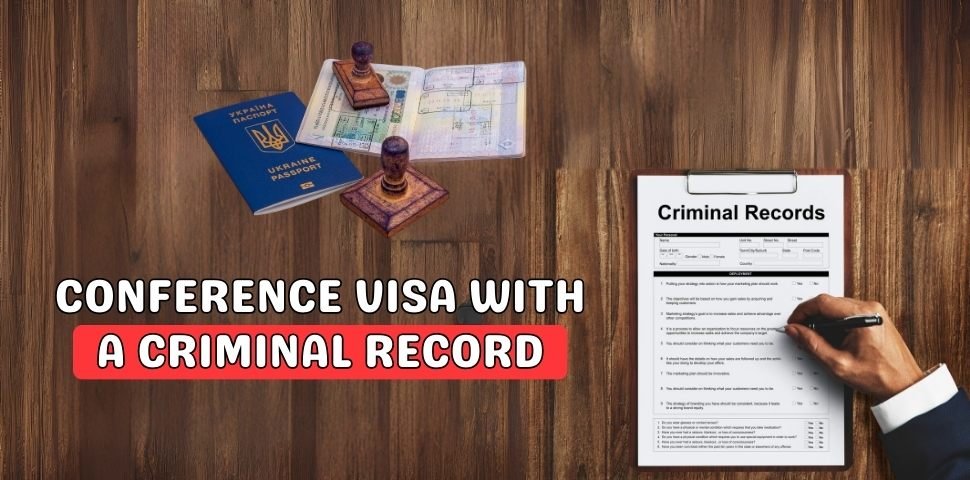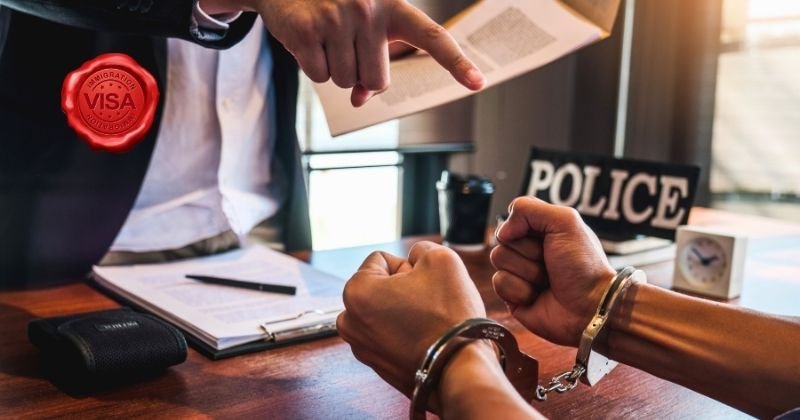Applying for a conference visa involves managing the complex landscape of international travel and legal considerations, especially for individuals who wish to participate in global events. There are specific requirements set forth by the destination country that must be understood. If you’re wondering, “Can I apply for a conference visa if I have a criminal record?”
There is a way, but it isn’t straightforward. Approval largely depends on the nature of your criminal record and the immigration laws of the country you plan to visit. Some countries may offer exceptions or waivers for certain convictions.
For personalized advice, consulting with an immigration attorney is highly recommended. If you wish to learn more about it then read on for more detailed insights into securing a conference visa under such circumstances.
What are the Conference Visa requirements?
When planning to attend an international conference, it’s important to understand the specific visa requirements of the host country. To obtain a conference visa for Canada, for example, you’ll need to prepare several documents and meet particular criteria to ensure a successful application. Here’s a brief overview of the general steps and requirements:
- A valid passport with a minimum of six months before expiration is typically required. Some countries may also require blank visa pages.
- An official invitation from the conference organizers is mandatory for most visa applications. This letter should include details of the event and your participation.
- Proof of financial stability is often required to show you can support your stay. This can include recent bank statements or sponsor letters.
- For those wishing to obtain a conference visa, demonstrating ties to your home country may be necessary. This helps assure that you’ll return after the event.
- A confirmed travel itinerary, including round-trip tickets and accommodation bookings, is another common requirement. Make sure your travel dates align with the conference schedule.
- Certain countries may ask for health insurance covering your stay. It is recommended to have a policy that meets the destination’s guidelines.
- Completing the visa application form accurately and paying the required fees is essential. Any inconsistencies may delay or deny your visa approval.
Can I apply for a Conference Visa if I Have a Criminal Record?
With a criminal record, applying for a conference visa is possible, but approval varies. The decision depends on the severity of the offense and the immigration laws of the destination country. Consulting with an immigration attorney can provide personalized guidance, as some countries offer waivers or exceptions for specific convictions.

Type of Criminal Record
The type of criminal record you have significantly impacts your visa application. Minor offenses may be viewed differently compared to serious crimes. Some countries will allow entry for lesser charges, but it’s case-specific.
In contrast, convictions for serious crimes like drug offenses or violent crimes may lead to visa denial. Countries take public safety seriously and consider these offenses a risk. Knowing your record’s severity is essential before applying.
Country-Specific Immigration Laws
Every country has its own immigration laws regarding criminal records. Some are more lenient, while others strictly enforce restrictions. Researching the country’s specific rules is vital to your application’s success.
For example, countries like Canada may have strict policies against certain convictions. On the other hand, some nations may provide waivers under specific conditions. This varies greatly depending on where you are planning to attend the conference.
Time Since the Conviction
The time that has passed since your conviction plays a major role in the decision. Recent offenses tend to face stricter scrutiny from immigration authorities. Older convictions may be viewed with leniency, especially if there is evidence of rehabilitation.
If many years have passed since the conviction and no further offenses occurred, this can work in your favor. Showing positive change can improve your chances of approval. Each case will be evaluated based on the timing of the offense.
Waivers or Exceptions
Certain countries may offer waivers or exceptions for particular convictions. These are often reserved for non-violent or lesser crimes. Applying for a waiver can improve your chances, but it may require additional steps.
For serious offenses, obtaining a waiver may involve legal representation or presenting compelling reasons for your visit. It’s not guaranteed, but some people succeed in getting exceptions. Understanding the waiver process is key to overcoming visa obstacles.
Supporting Documentation
Providing additional documentation that proves your intent to attend the conference and return home is crucial. This may include letters from employers or conference organizers. Documents showing personal rehabilitation or community involvement can also be helpful.
Supplying accurate and thorough paperwork can positively influence the decision. It shows the immigration authorities that you are serious about attending the event. Lack of proper documentation may lead to rejection, even with minor offenses.
Consulting an Immigration Attorney
Seeking professional legal advice from an immigration attorney is recommended if you have a criminal record. They can guide you through the complex visa application process. Their expertise can also help if additional paperwork or waivers are necessary.
An attorney’s guidance is invaluable in overcoming legal hurdles. They can provide specific advice tailored to your situation and increase your chances of success. Without proper legal help, you may face unnecessary delays or rejection.
Applying for a conference visa with a criminal record requires careful planning and understanding of the process. Each case is unique, and knowing the influencing factors can improve your chances. Always seek professional guidance to ensure the best outcome.
What Types of Criminal Records Affect Visa Approval?
When applying for a visa, certain types of criminal records can significantly impact your approval chances. Immigration authorities generally consider both the severity and the recency of the offense. Understanding the types of criminal records that affect visa approval can help you prepare your application better and increase your chances of success.

Violent Crimes
Convictions for violent crimes are often viewed very seriously by immigration authorities. Offenses like assault, robbery, or murder make visa approval more difficult. Countries prioritize public safety, and individuals with such records may be seen as potential risks. These types of convictions can greatly hinder your ability to travel internationally.
Drug-Related Offenses
Drug-related offenses, especially trafficking or distribution, usually face harsh scrutiny in visa applications. Even minor drug possession charges can raise concerns for some countries. Drug offenses suggest potential involvement in illegal activities, which authorities aim to prevent. For this reason, visas may be denied even for past offenses.
Financial Crimes
Financial crimes, such as fraud, money laundering, and embezzlement, are serious concerns for immigration authorities. These offenses typically indicate a breach of trust and can significantly compromise an applicant’s character assessment. Furthermore, getting a conference visa while unemployed, coupled with a criminal record involving financial crimes, can compound the challenges. This situation might intensify scrutiny from officials due to potential financial instability or perceived dishonesty.
Sexual Offenses
Sexual offenses are among the most strictly penalized in the visa approval process. Convictions related to sexual assault, harassment, or exploitation can lead to immediate denial. These offenses are considered severe violations of personal safety and moral conduct. Authorities often prioritize protecting vulnerable populations when reviewing visa applications.
Theft or Burglary
Theft-related offenses, especially burglary or grand larceny, may also impact your visa chances. These crimes suggest a disregard for the property and safety of others. Even if they were committed long ago, they can still create red flags. However, minor theft charges might be viewed with more leniency, depending on the circumstances.
Different types of criminal records can have varying impacts on visa applications. Understanding which offenses matter most will help you understand the process. Always consider seeking legal advice if you’re uncertain about your eligibility.
Steps to Take When Applying for a Visa with a Criminal Record
Applying for a visa with a criminal record can seem challenging, but careful preparation can improve your chances. It’s important to understand the process and know what steps to follow. Taking the right approach can help you comprehend the legal requirements and avoid unnecessary delays.

Step 1: Gather All Required Documents
Start by collecting all necessary documentation related to your criminal record and visa application. This includes court documents, proof of conviction, and any records of rehabilitation. Having accurate paperwork is critical in proving your case to immigration authorities. Without complete records, your application may be delayed or denied.
Step 2: Be Honest on Your Application
Always be truthful when filling out your visa application, especially regarding your criminal history. Attempting to hide past offenses can lead to automatic rejection. Immigration authorities conduct background checks and will likely discover any undisclosed information. Honesty improves your chances of receiving fair consideration.
Step 3: Provide Evidence of Rehabilitation
If possible, include documentation that demonstrates your rehabilitation and good conduct since the conviction. This can be letters of recommendation, proof of completed programs, or evidence of community involvement. Showing that you’ve made positive changes since your offense can improve your application’s outcome. Rehabilitation evidence strengthens your case and may sway immigration authorities.
Step 4: Consult an Immigration Attorney
Seeking professional legal advice from an immigration attorney can be a key step in your application process. They can help you make sense of complex legal procedures and provide personalized guidance. An attorney will know how to present your case in the best possible light. This professional support can increase your chances of success.
Step 5: Apply for a Waiver, If Needed
Some countries offer waivers for specific types of criminal offenses, allowing you to bypass restrictions. Research if your destination has such options and consult an attorney to apply. The waiver process may require additional steps and documentation, but it can be worth pursuing. It’s often a helpful tool for overcoming visa obstacles.
Step 6: Prepare for an Interview
In some cases, you may be asked to attend an interview as part of the visa process. This is a chance to explain your criminal record and rehabilitation efforts in person. Practice answering possible questions and gather supporting evidence before the interview. Being prepared will help you confidently present your case.
FAQs about Can I Apply for a Conference Visa If I Have a Criminal Record?
When it comes to applying for a conference visa with a criminal record, many people have questions about the process and eligibility. Here are some frequently asked questions that can help clarify common concerns and provide useful guidance for applicants.
Will My Visa automatically Be Denied Because of a Criminal Record?
No, your visa won’t automatically be denied. The outcome depends on the severity of your offense and the destination country’s immigration policies. Minor offenses might be considered differently from serious ones. Consulting with an immigration lawyer can improve your chances of approval.
Do all Countries Consider Criminal Records in Visa applications?
Yes, most countries do consider criminal records during visa applications. However, each country has different immigration laws regarding criminal history. Some nations may offer waivers or leniency for minor offenses, while others are more strict. Researching specific country requirements is essential.
Can I apply for a Waiver if My Visa is Denied?
Yes, some countries allow you to apply for a waiver, depending on the offense. Waivers are often available for non-violent crimes. Consulting an attorney can help determine whether you’re eligible for a waiver and guide you through the application process.
Does the Type of Crime Impact My Visa approval Chances?
Yes, the type of crime matters. Serious offenses like violent crimes or drug trafficking may lead to visa denial. Lesser offenses, such as minor theft or misdemeanors, might not affect your chances as severely. The context of the crime is crucial to the decision.
Will I Need Additional Documentation to Prove Rehabilitation?
Yes, it’s recommended to provide documentation showing rehabilitation efforts. This can include letters from employers, completed programs, or community involvement. Presenting evidence of positive change can improve your chances of approval by showing that you’re no longer a risk to society.
Should I Consult an Immigration Lawyer if I Have a Criminal Record?
Yes, consulting an immigration lawyer is strongly recommended. An attorney can help you understand the specific laws of your destination country and prepare a strong application. They’ll provide expert advice and guide you through the process, increasing your chances of success.
Final Thoughts
Securing a conference visa with a criminal record can be challenging, but it’s not impossible. The outcome largely depends on the type of offense, the country’s immigration laws, and your ability to provide supporting documentation.
If you’re wondering, “Can I apply for a conference visa if I have a criminal record?”, the answer is yes, though the process may require additional steps.
Consulting with an immigration attorney can greatly increase your chances by ensuring you follow the proper legal procedures. With thorough preparation, you can still attend the conference and achieve your professional goals.
